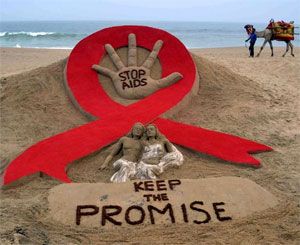 | « Back to article | Print this article |
India had the third-largest number of people living with HIV in the world at the end of 2013 and accounts for about four out of 10 people living with HIV in the Asian region. India is facing a shortage of HIV/AIDS drugs provided under the government's free medicine programme after some drugmakers halted supplies due to delayed payments, leaving thousands of patients without treatment, activists said.
India is facing a shortage of HIV/AIDS drugs provided under the government's free medicine programme after some drugmakers halted supplies due to delayed payments, leaving thousands of patients without treatment, activists said.
India's National AIDS Control Organisation (NACO), a unit of the healthcare ministry, procures antiretroviral drugs for treating HIV/AIDS from companies through a tender process and supplies the drugs to healthcare providers across the country.
Some drugmakers stopped participating in the government's tender process over the past year because of delays in getting paid, creating a shortage, said Leena Menghaney, an activist with the medical charity Medecins Sans Frontieres (MSF).
India had the third-largest number of people living with HIV in the world at the end of 2013 and accounts for about four out of 10 people living with HIV in the Asian region, according to the U.N. AIDS programme UNAIDS.
"The supply chain has broken down, tenders have not been filled. As a result there are not enough drugs in the programme to meet the needs of the people. Patients have been told to fend for themselves," Menghaney told Reuters.
"No manufacturer who supplies to the national programme, where the margins are miniscule, should have to be faced with payment delays. But the way to deal with that is not to boycott the programme."
Officials at NACO in New Delhi were not available to comment.
Delhi Network of Positive People, a trust that works with HIV/AIDS patients, is planning to file a lawsuit against the government over the shortage of the life-saving drugs in various states, said its president, Vikas Ahuja.
India has been providing free antiretroviral drugs for HIV treatment since 2004, but only 50 percent of those eligible for the treatment were getting it in 2012, a report last year by the World Health Organisation showed.
